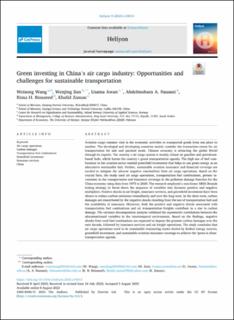| dc.contributor.author | Wang, Weisong | |
| dc.contributor.author | Sun, Wenjing | |
| dc.contributor.author | Awan, Usama | |
| dc.contributor.author | A. Nassani, Abdelmohsen | |
| dc.contributor.author | H. Binsaeed, Rima | |
| dc.contributor.author | Zaman, Khalid | |
| dc.date.accessioned | 2023-09-29T08:45:30Z | |
| dc.date.available | 2023-09-29T08:45:30Z | |
| dc.date.created | 2023-09-05T09:48:20Z | |
| dc.date.issued | 2023 | |
| dc.identifier.citation | Heliyon. 2023, 9 (8), e19013. | en_US |
| dc.identifier.issn | 2405-8440 | |
| dc.identifier.uri | https://hdl.handle.net/11250/3092989 | |
| dc.description | © 2023 The Authors. Published by Elsevier Ltd. This is an open access article under the CC BY license. | en_US |
| dc.description.abstract | Aviation cargo remains vital in the economic activities to transported goods from one place to another. The developed and developing countries mainly consider the transaction routes for air transportation for safe and quickest mode. Chinese economy is attracting the global World through its exports. The country's air cargo system is mainly reliant on gasoline and petroleum-based fuels, which harms the country's green transportation agenda. The high use of fuel combustions in the aviation sector needed greenfield investment that helps to use green energy as an alternative sustainable fuel. Further, sustainable aviation insurance and financial coverage are needed to mitigate the adverse negative externalities from air cargo operations. Based on the crucial facts, the study used air cargo operations, transportation fuel combustions, private investment in the transportation and insurance coverage in the pollution damage function for the China economy using data from 1975 to 2020. The research employed a non-linear ARDL Bounds testing strategy to break down the sequence of variables into dynamic positive and negative multipliers. Positive shocks in air freight, insurance services, and greenfield investment have been shown to reduce carbon emissions immediately and over the long term. In the short term, carbon damages are exacerbated by the negative shocks resulting from the use of transportation fuel and the availability of insurance. Moreover, both the positive and negative shocks associated with transportation fuel combustions and air transportation freights contribute to a rise in carbon damage. The variance decomposition analysis validated the asymmetric correlations between the aforementioned variables in the intertemporal environment. Based on the findings, negative shocks from total fuel combustions are expected to impose the greatest carbon damages over the next decade, followed by insurance services and air freight operations. The study concludes that air cargo operations need to be sustainable transacting routes fueled by biofuel energy sources, greenfield investment, and sustainable aviation insurance coverage to achieve the ‘green is clean’ transportation agenda. | en_US |
| dc.language.iso | eng | en_US |
| dc.rights | Navngivelse 4.0 Internasjonal | * |
| dc.rights.uri | http://creativecommons.org/licenses/by/4.0/deed.no | * |
| dc.subject | China | en_US |
| dc.subject | air cargo operations | en_US |
| dc.subject | carbon damages | en_US |
| dc.subject | transportation fuel combustions | en_US |
| dc.subject | greenfield investment | en_US |
| dc.subject | insurance services | en_US |
| dc.title | Green investing in China's air cargo industry: Opportunities and challenges for sustainable transportation | en_US |
| dc.type | Journal article | en_US |
| dc.type | Peer reviewed | en_US |
| dc.description.version | publishedVersion | en_US |
| dc.subject.nsi | VDP::Social science: 200::Economics: 210 | en_US |
| dc.source.pagenumber | 0 | en_US |
| dc.source.volume | 9 | en_US |
| dc.source.journal | Heliyon | en_US |
| dc.source.issue | 8 | en_US |
| dc.identifier.doi | 10.1016/j.heliyon.2023.e19013 | |
| dc.identifier.cristin | 2172362 | |
| dc.source.articlenumber | e19013 | en_US |
| cristin.ispublished | true | |
| cristin.fulltext | original | |
| cristin.qualitycode | 1 | |

